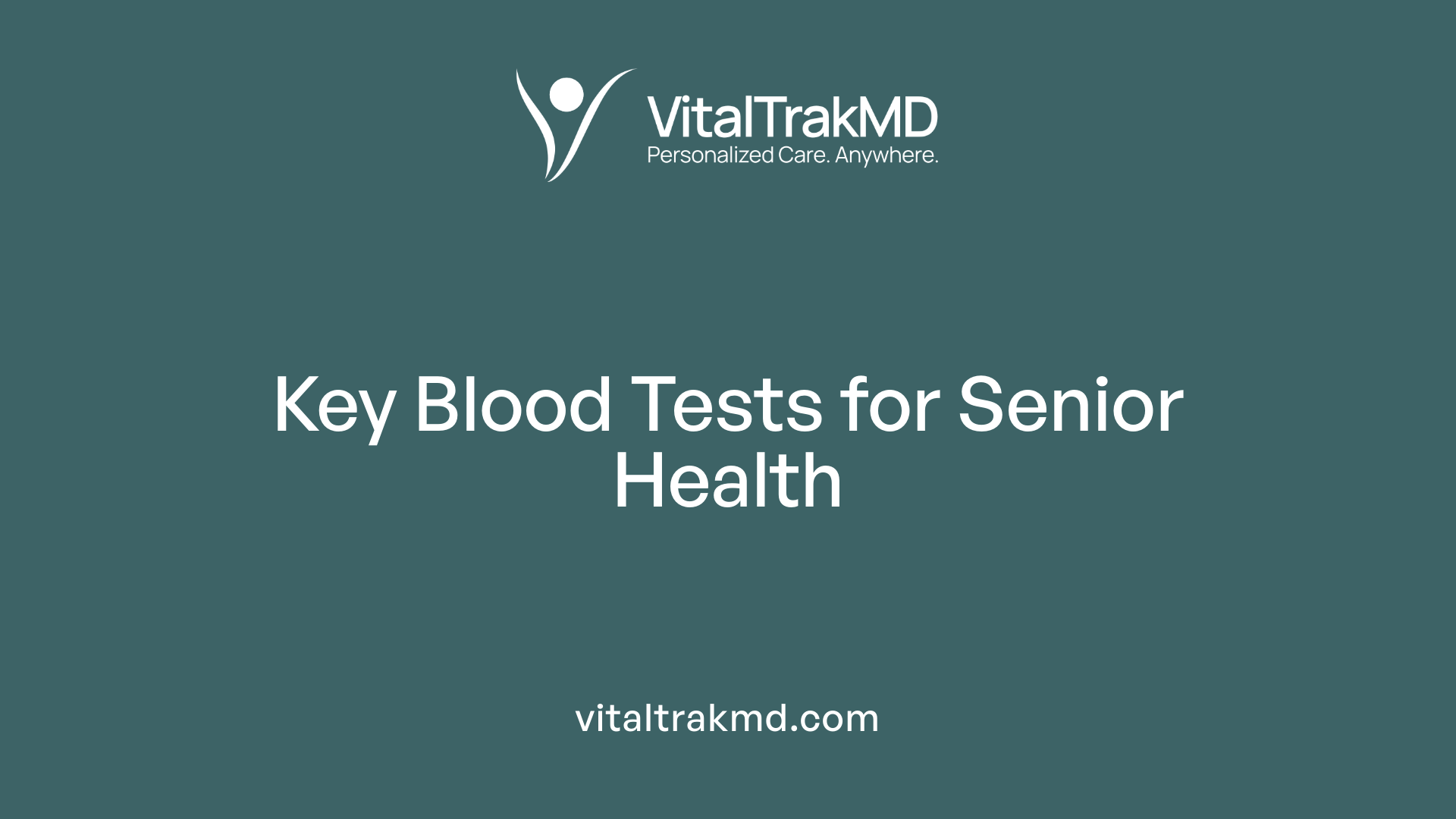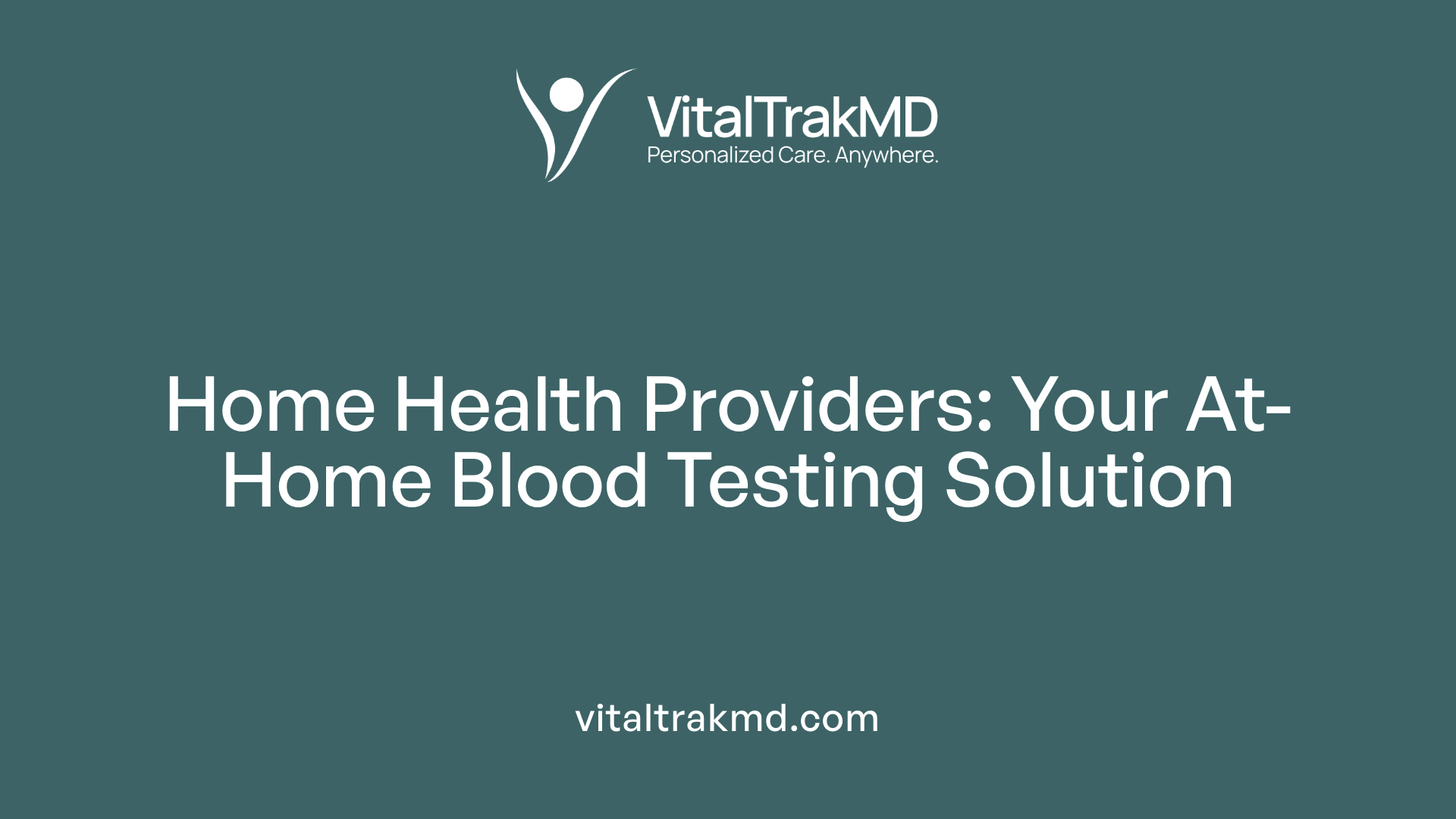Home Lab Services Versus Traditional Lab Draws: What Seniors Should Know

Understanding the Growing Role of Home Lab Services for Seniors
As the demand for accessible, convenient healthcare options increases, especially among the aging population, home lab services are emerging as a vital alternative to traditional laboratory draws. This article explores the differences, benefits, and considerations for seniors when choosing between home and traditional testing methods, ensuring informed healthcare decisions.
The Spectrum of Blood Tests Essential for Seniors

What blood tests are recommended for seniors?
For seniors, routine blood testing plays a vital role in maintaining health and catching potential issues early. Several key tests are recommended depending on individual health conditions.
One common test is the Complete Blood Count (CBC), which screens for anemia, infections, and overall blood health. Kidney function is assessed through tests measuring blood urea nitrogen (BUN) and creatinine levels. Monitoring blood glucose is crucial for detecting or managing diabetes, while lipid profiles evaluate cholesterol and triglyceride levels to assess cardiovascular risk.
Thyroid function tests, including TSH, T3, and T4, help identify thyroid imbalances that can affect energy and metabolism. Additional tests such as vitamin D levels, liver function panels, and markers of inflammation or rheumatoid factors provide a comprehensive picture of the health status of seniors.
Regular testing helps in early detection of age-related conditions, allowing timely interventions.
Monitoring age-related health issues
As people age, certain health issues become more common, such as kidney decline, thyroid disorders, and cardiovascular problems.
Blood tests are instrumental in tracking these changes. For example, kidney and liver function tests can reveal declines in organ efficiency. Lipid panels help detect atherosclerosis risk, and blood sugar testing is essential with the increasing prevalence of diabetes among older adults.
Screening for inflammatory markers assists in identifying chronic inflammation linked to aging and certain diseases like rheumatoid arthritis.
These tests, especially when scheduled periodically, can guide adjustments in medications or lifestyle to improve quality of life.
Early detection and management of conditions
Early identification of health issues through blood testing enables proactive management, potentially reducing hospitalizations and severe complications. For seniors, managing conditions like hypothyroidism, anemia, or high cholesterol is critical in maintaining independence.
Mobile phlebotomy services facilitate this ongoing monitoring, making it easier for seniors or their caregivers to schedule tests at home, avoiding travel and long waits.
By combining regular testing with health consultations, healthcare providers can create personalized care plans that address age-related changes while promoting healthy aging.
| Test Type | Purpose | Typical Frequency | Additional Notes |
|---|---|---|---|
| Complete Blood Count (CBC) | Detect anemia, infections, blood disorders | Annually or as needed | Basic screening tool for overall blood health |
| Kidney Function Tests | Monitor kidney health | Every 6-12 months | Important for seniors with hypertension or diabetes |
| Blood Glucose | Screen for or manage diabetes | Annually or more frequently for diabetics | Fasting or random testing |
| Lipid Profile | Assess cardiovascular risk | Every 1-2 years | Includes total cholesterol, LDL, HDL, triglycerides |
| Thyroid Panel | Detect thyroid dysfunction | Every 1-2 years | TSH, T3, T4 tests |
| Vitamin D Levels | Monitor bone health | Annually | Often deficient in older adults |
Ongoing blood testing, paired with lifestyle adjustments and medical care, supports seniors in healthy aging and early intervention.
Capabilities of Home Health Providers in Performing Blood Draws

Are home health providers able to perform blood draws?
Many home health providers can indeed perform blood draws, offering a crucial service for patients who face difficulties traveling or prefer the comfort of their own homes. These providers are typically trained and certified professionals, often called mobile phlebotomists, who follow strict safety and quality standards.
Training and certification of home health providers ensure they are skilled in collecting various blood samples necessary for laboratory testing. They are equipped to handle routine blood work, such as complete blood count (CBC), lipid profiles, blood glucose levels, as well as specialized tests like kidney and liver function panels.
Types of blood test samples collected at home
Home health providers collect different types of samples, including standard vials of blood, which are then sent to laboratories for analysis. These services utilize specialized collection kits that allow the samples to maintain integrity without extensive processing at the patient's location. This process often involves just a simple finger prick or venipuncture, depending on the test.
Advantages for patients with mobility issues
Mobile blood draws significantly benefit patients with mobility challenges, such as seniors, individuals with disabilities, or those who are homebound. It reduces the need for travel, waiting times, and exposure to healthcare environments, creating a less stressful, more private experience.
Patients can schedule appointments at flexible times, including early mornings and weekends, which enhances accessibility. The convenience and comfort provided by home blood collection support ongoing health management, especially for chronic conditions requiring regular testing.
| Aspect | Details | Additional Notes |
|---|---|---|
| Service Scope | Routine, specialized, and chronic care testing | Includes COVID-19, diabetes, and other diagnostics |
| Sample Types | Blood, sometimes saliva or urine | Usually handled with sterile kits |
| Patient Benefits | Convenience, comfort, safety | Especially for mobility-impaired and elderly patients |
| Provider Qualifications | Certified and trained medical professionals | Aligned with CDC standards |
This integration of trained professionals into home environments ensures that diagnostic processes remain safe, accurate, and patient-centered, making home blood draws an increasingly vital part of modern healthcare.
Performing Blood Tests at Home: Feasibility and Providers

How is at-home testing conducted?
Mobile phlebotomy services make it possible for patients to have blood tests conducted right at their homes or workplaces. Certified professionals, known as mobile phlebotomists, visit the patient's location equipped with all necessary supplies, following strict safety protocols guided by CDC standards. The process typically lasts less than 20 minutes, during which the blood samples are collected, labeled, and safely packaged for laboratory analysis.
Patients can schedule appointments at their convenience, including early mornings and weekends, enhancing accessibility especially for seniors, individuals with mobility issues, or busy professionals. These services focus on patient comfort, privacy, and reducing the stress associated with visiting a traditional laboratory setting.
Leading providers and protocols
Top companies like Quest Diagnostics and BioReference Laboratories provide mobile blood draw services across the U.S., including states like Florida. These organizations employ trained phlebotomists who adhere to rigorous safety and quality standards, aiming for high specimen integrity and patient safety.
During the COVID-19 pandemic, the importance of such services increased, supporting large-scale testing efforts and reducing exposure risks. Many providers strive to meet safety regulations and some seek accreditation to ensure service quality.
How samples are processed and how accuracy is maintained
Once samples are collected, they are transported promptly to accredited laboratories that utilize advanced technologies to guarantee testing accuracy. Breakthroughs in logistics and sample handling procedures help maintain specimen integrity and reliability.
Results are typically delivered within 24-48 hours, allowing quick health assessments and diagnoses. Many at-home testing companies also implement digital reporting systems, ensuring privacy and security of patient data.
Overall, at-home blood testing provides a safe, accurate, and convenient alternative to traditional lab visits, supported by reputable providers following established protocols to ensure high standards of care and accurate results.
Insurance Coverage and Medicare Support for Home Blood Draws
Medicare and insurance policies play a crucial role in making mobile blood draws accessible to eligible patients. Medicare, the federal health insurance program primarily for seniors and certain disabled individuals, does provide coverage for home blood draws under specific conditions.
To qualify, patients must be considered homebound, meaning leaving their home requires considerable effort or is medically contraindicated. The service must be medically necessary, and the blood draw should be part of a physician-ordered care plan focused on managing a chronic condition or administering treatment.
Documentation is an essential element for reimbursement. Patients need a detailed physician's order, proof of medical necessity, and a comprehensive plan of care. These documents confirm that the home blood draw is an integral part of ongoing medical management.
Additionally, the laboratories and home health agencies involved must meet certain certification standards and comply with regulations to qualify for Medicare coverage. This ensures high safety and quality standards are maintained.
Understanding the specifics of coverage can help patients access these convenient services without financial strain. For more detailed information, patients and caregivers can search for "Medicare coverage for home blood testing," "insurance reimbursement for mobile phlebotomy," or "home health services insurance policies" to explore their options.
Comparative Benefits: Mobile Phlebotomy Versus Traditional Testing
Convenience and safety
Mobile phlebotomy offers significant advantages in terms of convenience and safety. Instead of traveling to a clinic or hospital, patients have trained professionals come directly to their homes or workplaces. This reduces the exposure to public healthcare environments, which is particularly important during health crises like the COVID-19 pandemic. Mobile services follow strict safety and quality standards, ensuring secure specimen collection that maintains high accuracy, with safety protocols strictly observed.
Time and location flexibility
One of the main benefits of mobile blood draws is the ability to schedule appointments at flexible times—including early mornings and weekends. This adaptability helps accommodate busy work schedules and personal routines, making healthcare more accessible. Mobile phlebotomy units are equipped to reach various locations, from homes to community centers, providing services outside conventional hours and settings.
Patient comfort and privacy
Receiving blood draws at home creates a more comfortable and less intimidating environment, especially for children, seniors, or individuals with needle phobia. It also provides enhanced privacy and dignity, as patients can avoid crowded clinics or hospitals. Mobile services enable patients to choose familiar locations, which can lessen anxiety and improve the overall testing experience.
Cost implications and insurance coverage
While mobile testing might typically involve a modest premium over traditional lab visits, many insurance plans now cover these services, particularly for homebound or chronic care patients. By eliminating travel expenses and reducing wait times, mobile phlebotomy can ultimately be cost-effective. Additionally, it can decrease the indirect costs associated with hospital visits, such as transportation fees and time off work.
| Aspect | Traditional Testing | Mobile Phlebotomy | Details |
|---|---|---|---|
| Convenience | Less flexible, clinics/hospitals | Highly flexible, home/workplace | Mobile services adapt to patient schedules and locations |
| Patient comfort | Less control, busy clinics | Personalized, familiar environment | Mobile draws provide comfort, especially for children and seniors |
| Safety | Standard protocols, risk of crowded settings | Strict safety standards, reduced infection risk | Mobile units follow CDC protocols, ensuring high safety standards |
| Cost | Potentially lower upfront | Slightly higher, but offset by savings in travel | Insurance coverage varies; mobile often supported for specific populations |
Mobile phlebotomy is becoming an increasingly popular and practical alternative to traditional blood testing, especially for older adults, patients with mobility challenges, and busy professionals. Its flexibility and safety features help foster better healthcare access while ensuring high-quality specimen collection.
Future Trends in Senior Blood Testing and Accessibility

How are technological advancements shaping mobile healthcare?
Innovations in mobile health technology are transforming how blood testing and diagnostics are delivered. Portable blood analyzers, telemedicine integration, and digital health platforms now allow for faster, more accurate testing outside traditional labs. These tools enable healthcare providers to monitor chronic conditions remotely and make real-time adjustments to treatment plans.
What is the growth of at-home testing services?
Over recent years, at-home testing services have experienced rapid expansion. Companies now offer a variety of tests—from basic panels to specialized diagnostics—delivered directly to patients' homes. This growth is driven by increased demand for convenience, privacy, and proactive health management among all age groups, especially seniors.
How has COVID-19 impacted healthcare access?
The COVID-19 pandemic accelerated the adoption of in-home and mobile healthcare services, reducing the need for hospital visits and minimizing virus exposure risks. Mobile phlebotomy and remote testing became vital in maintaining essential healthcare services during lockdowns and continues to influence healthcare delivery models.
What are emerging innovations in mobile healthcare delivery?
Emerging innovations include AI-driven scheduling and diagnostic systems, mobile clinics equipped with advanced testing technology, and integration of wearable devices with mobile health platforms. These developments aim to boost accessibility, streamline operations, and enhance patient experience in senior care.
| Future Developments | Description | Expected Impact |
|---|---|---|
| Portable Diagnostic Devices | Compact tools for blood analysis on-the-go | Faster results, increased convenience |
| Integration of Wearables | Linking health data from wearables to mobile labs | Continuous monitoring, early detection |
| Smart Scheduling Systems | AI to optimize appointment times | Reduced wait times, personalized care |
| Mobile Clinics Expansion | More mobile units equipped with advanced technology | Reaching underserved communities |
Advancements in technology and rising demand for at-home healthcare options are set to reshape senior blood testing, making it more accessible, efficient, and patient-focused.
Empowering Seniors with Informed Testing Choices
Understanding the options for blood testing, including the convenience and safety of home services versus traditional labs, empowers seniors to make informed healthcare decisions. As technology advances and services become more accessible, seniors can enjoy better health management, increased comfort, and greater independence through tailored testing solutions.
References
- Mobile Phlebotomy vs. Lab Visits: Which Is Best for You?
- At-Home Blood Tests Are Becoming A Trend. What It Means for ...
- Mobile Blood Draw Units vs. Traditional Phlebotomy Labs
- 5 Types of Patients Who Benefit from Mobile Phlebotomy
- Big gaps seen in home medical test use by older adults
- The Benefits of Using Mobile Phlebotomy Services
- Mobile Phlebotomy vs. Traditional Lab Visits: Which Is Right for You?
- How Mobile Blood Testing Makes Healthcare More Accessible
- The Importance of Mobile Lab Services in Home Healthcare
- Mobile Phlebotomy Services — Precision Life Sciences
Recent articles
Want to Feel Better and Live Healthier?
Join hundreds of patients taking control of their health with personalized care that fits their life – not the other way around.
Rated 4.8/5 by 32+ customers







